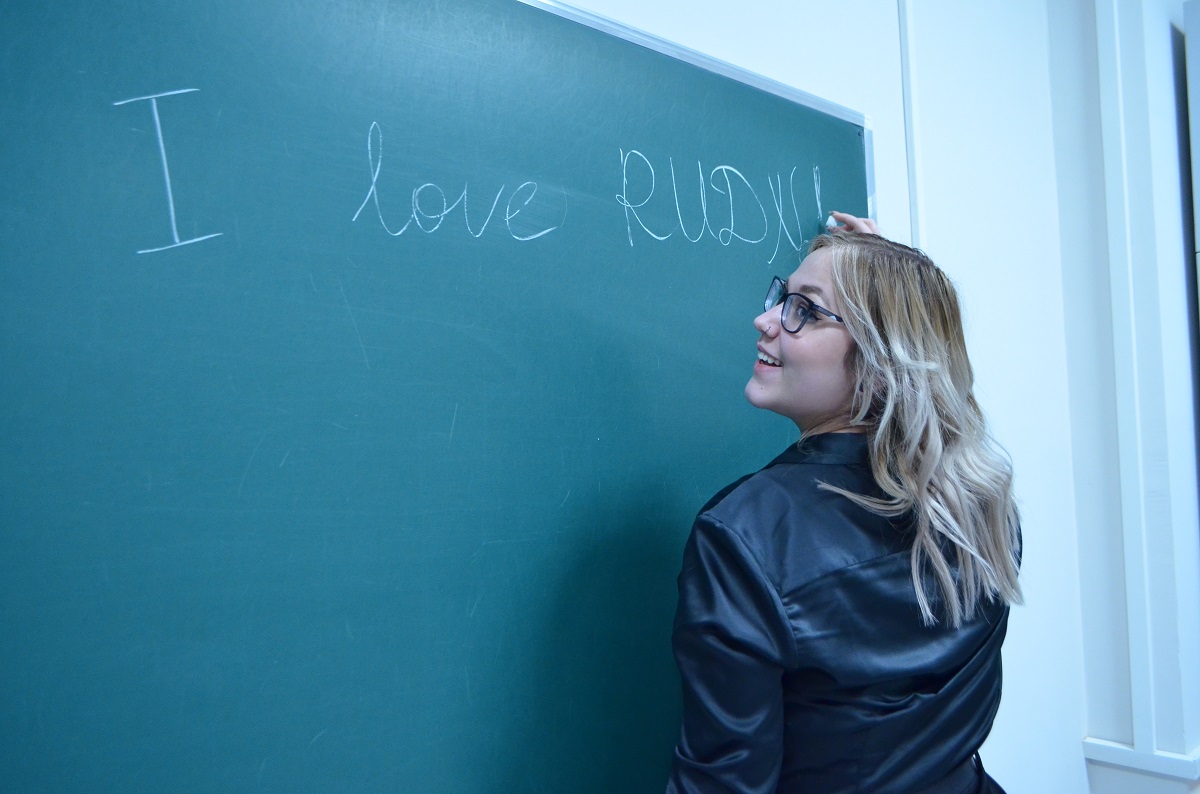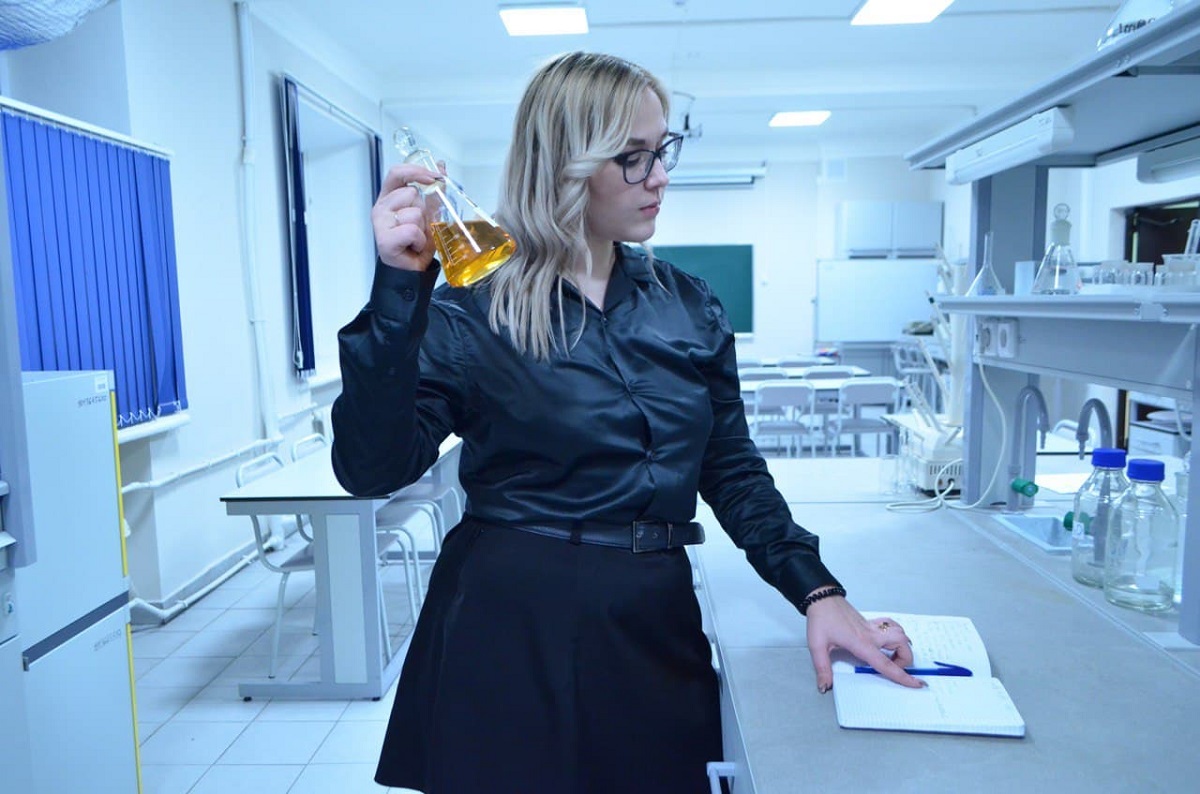“It is important to be able to come up with ‘new’ chemistry” — Maria Grudova, student of the Faculty of Science
How did you find yourself studying Chemistry at RUDN University?
At school, I was waiting for this subject — chemistry seemed to me something special. But in the first year the only thing we did was copying the textbook — I was disappointed. Only later, when we went through the properties of substances and various compounds, I began to fall in love with this subject. In the 10th grade, my teacher Vera Nikolaevna Plaskina helped me a lot — I began to participate in chemistry Olympiads and show demonstration experiments in the classroom ... I completely and irrevocably fell in love with chemistry.
After school, I did not consider any options other than chemistry, but I did not decide on the university. A friend of mine studied at RUDN University. He suggested I submit documents just to see whether I would pass or not. I was charmed by the admission committee — they told me about an increased stipend for high scorers, a free translation diploma and a dormitory. Almost on the last day of the admission campaign, I submitted documents and soon saw my name on the lists for enrollment.
Which chemical reactions do you like the most, and which ones do you like the least?
The most spectacular experiment in chemistry is the combustion of hydrogen gas. It is accompanied by a loud barking sound. I also like grinding iodine with aluminum into powder, which can then be catalyzed with a few drops of water — a beautiful cloud of dark purple iodine vapor will appear. I am inspired by our experiments on the preparation and study of the properties of gold isocyanide complexes: different polymorphs obtained for the first time glow differently under UV radiation. It fascinates me. But I’m not happy with those reactions that form a lot of by-products difficult to wash off chemical dishes.
Together with RUDN Associate Professor Fedor Zubkov, you developed a method for the synthesis of triazinans and discovered the “conformational anchor” of the tertiary-butyl group in the axial position. At RUDN Scientific Center for Crystal Chemistry and X-Ray Analysis under the guidance of Alexander Tskhovrebov, you discovered a new reaction for supramolecules. For the average person, this is a set of incomprehensible terms. What is it and why is it needed?
Finding the axial position of the tertiary-butyl group is like winning an apartment in the lottery. In general, our discoveries with Professor Zubkov are important in the design of crystals.
Supramolecular building blocks are when many molecules are combined into one large group. They are needed for the formation of chalcogen interactions — reactions with selenium, sulfur, oxygen ... Such compounds are needed for the development of molecular materials with conductive and magnetic properties. We investigate the factors under which molecules self-organize in space for the desired compounds. Now we are studying the mechanism and synthetic features of this reaction.
Many people like gold because it glitters. What interests you about gold?
I confess that I dreamed of studying organometallic chemistry. And just a year ago, we started working together with an amazing and experienced scientist — Alexander Tskhovrebov, who proposed an idea of synthesizing gold complexes, which I was able to implement 100%. What a beautiful theme! It became my favorite study, and we achieved result. Previously, special substances and difficult conditions were needed to study gold compounds. We proposed a new technique that can be implemented in any laboratory. The obtained substances have interesting photophysical, thermochromic and vapochromic properties. They can be used in detectors, sensors and probes. We have received new substances that in the future will allow us to treat cancerous tumors. I dream that our research will change the world and make the lives of many people better.
What motivates you to write scientific articles?
The ability of scientists to share their results with the world is a useful academic skill. In the modern world, the “status” and “coolness” of a scientist is measured by the number of articles in high-ranking journals and their citations. It is important to be able not only to conduct research, but to show its novelty and usefulness, as well as find patterns. If it works, then it is very motivating.
What qualities help you as a chemist?
I am helped by a passion for chemistry and curiosity. I can do science 12 hours a day, on weekends, holidays, all the year round. I work as a research laboratory assistant at RUDN Scientific Center for Crystal Chemistry and X-Ray Diffraction Analysis. I go to work like to a festivity. Perseverance, diligence and discipline are also important — it is important to carry out syntheses from beginning to end. It takes motivation, flexibility and creativity. Chemistry is a kind of art, and one must be able to find more successful ways to implement syntheses or invent a “new” chemistry. You can’t do without the ability to work in a team: share experience, cheer up colleagues when work is stuck.
How does a typical working day for a chemist go?
I set up and/or process syntheses, isolate and purify substances, in parallel draw up synthesis methods, examine data obtained by different methods of analysis. For example, NMR spectroscopy and X-ray diffraction analysis are my favorite and most informative methods of analysis. They help to determine the structure of the product formed during the reaction with an accuracy of up to 100%. If I have free time, I study the publications of authors who work on my subject, or read chemical literature. I also conduct demonstration experiments for students of other years.
How do you manage to combine science, study and work?
Scientific activity, study and work is chemistry. And chemistry is my meaning of life. I love my job, so all this makes me happy. I am happy that I chose chemistry, because it is improving and developing, practically living its own life. This energy inspires me to work and grow. Contributing to chemistry is my goal.
Name three most useful sources of information for a chemist in your opinion
In my opinion three most useful books for a chemist:
- “Organic synthesis” by Michael B. Smith;
- “March’s Advanced Organic Chemistry: Reactions, Mechanisms, and Structure” also by Michael B. Smith;
- Website for researchers: scifinder-n.cas.org
What quality do you value most in RUDN University?
Responsiveness. Any questions can be answered. Here they always encourage the thirst for knowledge, support projects, help apply for grants and allocate internal funding. RUDN University is developing together with its students. I have been at RUDN University for 6 years, and it has changed for the better — it has become modern, open and really the coolest!
If RUDN were a person, what would you give as a birthday present?
I would give RUDN University money: to support talented students and researchers, to develop buildings and educational / research spaces, as well as to establish international relations so that as many people as possible from different countries of the world had an opportunity to become part of RUDN University.
What would you like to add?
I haven’t talked about people who instill a love of chemistry. My first supervisor was PhD Aleksey Kletskov and Doctor of Chemistry, Associate Professor of the Department of Inorganic Chemistry Andrey Kritchenkov. They train professionals for the whole world. I am grateful to them for development, desire to help find answers to chemical questions.
RUDN University staff and alumni received state and departmental awards at the State Kremlin Palace during a festive concert in honor of RUDN 65th anniversary.
An architectural-landscape project by a 5th-year student of RUDN has been shortlisted for the annual International Professional ADD AWARDS 2024 for architects, designers, and developers in the “Urban Environment” category.
RUDN University employees’ work and contribution to the development of the university cannot go unappreciated. The Ministry of Science and Higher Education of Russia recognizes talented university employees and present them with various departmental and state awards.
.jpg)
.jpg)
.jpg)

